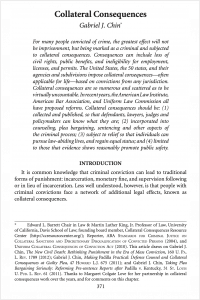Collateral Consequences
Gabriel J. Chin, in Reforming Criminal Justice: Vol 4. Punishment, Incarceration, and Release (Erik Luna ed.)
Part of The Academy for Justice report, Reforming Criminal Justice: Vol 4. Punishment, Incarceration, and Release (PDF), this article argues that, for many people convicted of crime, the greatest effect will not be imprisonment, but being marked as a criminal and subjected to collateral consequences. Consequences can include loss of civil rights, public benefits, and ineligibility for employment, licenses, and permits. The United States, the 50 states, and their agencies and subdivisions impose collateral consequences—often applicable for life—based on convictions from any jurisdiction.
The article's author contends that collateral consequences are so numerous and scattered as to be virtually uncountable. In recent years, the American Law Institute, American Bar Association, and Uniform Law Commission all have proposed reforms. The article further argues that collateral consequences should be: (1) collected and published, so that defendants, lawyers, judges and policymakers can know what they are; (2) incorporated into counseling, plea bargaining, sentencing and other aspects of the criminal process; (3) subject to relief so that individuals can pursue law-abiding lives, and regain equal status; and (4) limited to those that evidence shows reasonably promote public safety.
